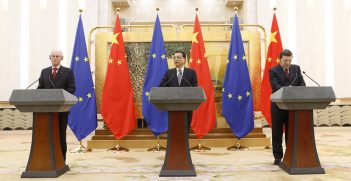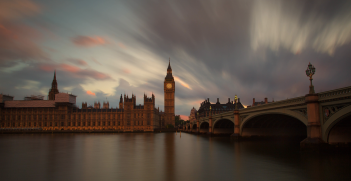Europe is Sleepwalking into a Major Political Crisis

Catalonia has a long history of distinctive culture and language both of which have fueled political calls for self rule. Yet independence has been ruled out by both the Spanish Government and the EU, which refuse to recognise a right to self determination.
Events in Catalonia are again spiralling out of control following the 1 October affirmative vote on independence for Catalonia. On the Spanish side, there are threats to suspend Catalan political autonomy and some of the lesser lights of the pro-independence movement have been detained; some have been refused bail. On the Catalan side, the threat of a unilateral declaration of independence with or without international recognition has Madrid nervous and susceptible to overreaction.
Madrid’s reaction
Most people were dismayed with the use of force by the Government of Spain to disrupt and invalidate the referendum on the independence of Catalonia. It is not as if Catalan independence moves were unknown to the Spanish authorities. Catalonia has a long history of distinctive culture and language both of which have fuelled political calls for self rule. More recently, calls for greater autonomy have preceded the referendum gambit.
Although many Spaniards point to the unity clause in the Spanish constitution of 1978 (it states that the union is indissoluble), there are also provisions written into the constitution to ensure the rights of minorities and distinct cultures and languages like those of the Catalans and Basques. Certainly, it is quite odd to see the Government of Spain and its constitutional court invalidate a referendum on self-determination, which is an internationally recognised right of peoples in international law.
Speaking historically, the intention of the drafters of the 1978 Spanish constitution was to move Spain into the European circle of democratic nations after a prolonged period of fascism under the leadership of the dictator Franco. It is doubtful whether they would agree to Madrid using the constitution as an excuse to visit force on the Catalan people and invalidate rights including the right to self-determination in the name of nationalism and unity. These actions are not consonant with the rule of law. As such, their implementation by an EU signatory country cannot be considered an internal matter. This is the first takeaway from recent events, in addition to the lasting bad will towards the Government of Spain that has been created amongst the Catalans.
Invalidating the right of self-determination enshrined in the Spanish constitution raises questions about the democratic validity of such a constitution. What other rights can be unilaterally abrogated? Contrary to the views of many of the national politicians of Spain, including the king, the constitution itself is no guarantee of rule of law. One has only to think of the USSR and its constitution, which allowed the Soviet state to violate the rights of untold numbers of minorities.
The European Union’s reaction
Another observation from these recent events in Spain is the lacklustre European response. Apart from some feeble reproaches about the referendum violence visited on the Catalan people during the referendum, the EU has accepted Madrid’s dubious interpretation of the Spanish constitution, saying that the crisis is an internal issue.
By declaring the Catalonia vote illegal and an internal Spanish matter and by refusing to insist on dialogue, the EU could provoke a general strike in Catalonia and risk setting off more political violence. Moreover, Catalonia is not the only independence seeker in Europe. Even in Spain, the Basques are known for their independence movement and their military wing (ETA) was a hundred times more dangerous than anything the Catalans have been able to muster.
Clearly, the right to self-determination has been put aside as the Europeans obediently line up behind the status quo. Apparently, it is easier to deal with post-war states no matter how they behave than it is to deal with democratic independence movements going on under their very noses. If the EU is prepared to accept a Brexit vote approving the separation of the UK, is that really so different to Catalonia seeking to become a new state given its cultural, linguistic and economic profile?
The Europeans have damaged their reputation by their mutism when it comes to promoting human rights within the EU itself and their inaction harks back to a much darker age of moral collapse and loss of balance. Like Franco’s Spain, one can detect theoretical currents lurking just under the surface of European ‘political gallantry’ and bureaucratic circumstance. Catalonia is proving Europe an unseemly deception. Before gleefully thumbing their noses at US President Donald Trump and his parade of rednecks and gun runners, the Europeans need to scan their own conscience and summon the moral courage to insist on dialogue in Spain and, if necessary, the independence of Catalonia.
The pro-independence Catalans
Given the manifest bad faith of the Government of Spain and its backers in the EU, Catalan President Carles Puigdemont has had to waffle on the issuance of a unilateral declaration of independence in his speech of 10 October. His is not an easy task since he is managing a political coalition with the separatist left while being subjected to pressure tactics from the Spanish government. He has called for discussion and negotiations. Of course, not all Catalans seek independence. Puigdemont knows this and must exercise caution in order that the intended move to independence succeeds in obtaining a relative consensus amongst his fellow citizens.
Meanwhile, the Government of Spain repeats its empty slogans saying the referendum was illegal and unconstitutional. Having been instrumental in creating the political tensions and crisis, the Government of Spain is now seeking to have Puigdemont ‘clarify’ his position on whether or not he has declared Catalonia independent or not.
The international community
Americans, Canadians, Australians, New Zealanders and other non-Europeans should not forget the special links we have with the people of Catalonia forged during the Spanish civil war of 1936-9. Over 3,500 Americans and 1,300 Canadians fought heroically against the Spanish fascists under Franco aided by Mussolini and Hitler. Fighters from across North America and elsewhere made the ultimate sacrifice in order that Catalonia be free from dictatorship. Unfortunately, the official reaction of the countries from which these freedom fighters came does not reflect this special historical relationship at all.
The way ahead
Although direct rule can be imposed in varying degrees on Catalonia, it will mean the dissolution of the Catalan parliament and possible new elections, seizing and securing control over public broadcasting and media outlets and some form of control over local police.
The imposition of direct rule from Madrid would likely trigger a unilateral declaration of independence of Catalonia. These actions taken together will result in a serious escalation of the crisis and an undetermined number of moderate Catalans will gravitate toward the independence camp.
In such circumstances, one can only hope for the Spanish government to change its tone and circular reasoning based on a dubious constitutional thesis; and that Europe intervenes more energetically to ensure the full recognition of the rights to self-determination and rule of law, which do not necessarily translate into apathy, paralysis and the status quo.
Dr Bruce Mabley is the director of the Mackenzie-Papineau Group think tank based in Montreal devoted to analysis of international politics. Dr Mabley is a former Canadian diplomat and academic who has written a number of analytical and academic texts.
This article is published under a Creative Commons Licence, and may be republished with attribution.





